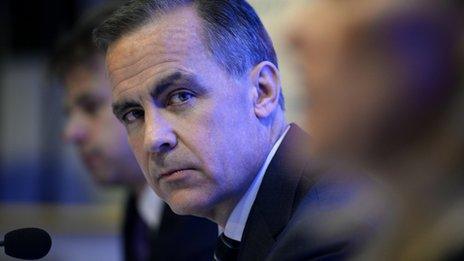Carney: interest rates permanently lower
- Published
- comments

At a lunch for business leaders in Davos, Mark Carney made some remarks which showed that he does not want interest rates to rise for some time yet, even though unemployment is very close to the level where the Bank of England would in theory start to evaluate whether it is time for the cost of money to increase.
The governor of the Bank of England said that the central bank now believes that the unemployment rate consistent with stability in inflation is lower than it believed last summer.
Then it took the view that there might start to be inflationary movements in wages once the unemployment rate fell to 6.5% - which is not to be confused with the 7% threshold for the Bank to start reviewing interest rates as part of its so-called "forward guidance" policy.
Mr Carney said: "It now seems likely that the rate of unemployment consistent with stable inflation in the medium term is somewhat lower than the MPC assessed back in August."
Although Mr Carney did not say what level of unemployment the Bank now saw as likely to have inflationary consequences, he will be seen as indicating that if he gets his way, the Bank's policy rate will stay at the record low of 0.5% for many months yet.
I say "if he gets his way" because he is only one of the voting members of the Bank's Monetary Policy Committee, or MPC, and I am told that some members are beginning to think it might be wise to start raising interest rates, albeit gently.
The current unemployment rate is 7.1% - and it has been falling sharply through 2013.
Mr Carney also said: "The level of interest rates necessary to sustain low unemployment and price stability will be somewhat lower than before the crisis.
"In the jargon, the equilibrium real interest rate, which has been negative for much of the period since the crisis, will eventually turn positive again, but it is likely to remain well below historical norms."
Defended
The persistence of low interest rates for years to come reflects the mountain of debt that was accumulated in the UK during the boom years - and the fact that non-bank debt in aggregate, namely business, government and household debts, have continued to rise since then.
The former US Treasury Secretary, Larry Summers, has argued recently that for many of the developed economies, real interest rates - interest rates minus the inflation rate - may have to remain negative for many years.
Mr Carney also defended the "forward guidance" policy he introduced in the summer, even though an important element of that guidance, the unemployment threshold, looks set to be breached much earlier than the Bank expected.
He said the Bank's forward guidance had through the autumn given confidence to households and businesses that interest rates would remain low and stable, which had contributed to the current strength of the UK's economic recovery.
Mr Carney said that the Bank would evaluate whether to change elements of its forward guidance in its February Inflation Report.